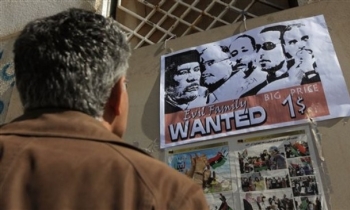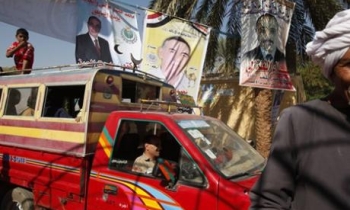Another cartoon row seems to be brewing up in – this time in Sweden where a newspaper has published a cartoon depicting the Prophet Mohammed as a dog. Iran summoned Sweden's charge d'affaires on Monday to protest against the publication of the “disrespectful" drawing of the prophet. Leading figures in Sweden's media industry have backed newspaper Nerikes Allehanda, which has published the cartoon.
The Swedish chargé d'affaires, Gunilla von Bahr, was summoned to the Iranian foreign ministry Monday. "A protest was given to her because of the publication in a newspaper of a cartoon of the prophet Mohammed," a Swedish foreign ministry spokeswoman, Sofia Karlberg, said Tuesday. "She was told it was an insult against the prophet. We consider the matter closed."
The cartoon in question, by Swedish artist Lars Vilks, depicted Mohammed's head on the body of a dog. Vilks had found it hard to find a gallery willing to display his work, and Nerikes Allehanda published the cartoon alongside an editorial on freedom of expression.
Nerikes Allehanda decided to publish the drawing following a row in the Nordic country this summer over Vilks' attempt to exhibit his series of drawings about Mohammed. At least two galleries declined to show the pictures, citing security fears.
"Alongside the picture, we published a comment piece saying that it was serious that there is self-censorship among exhibition [galleries]," Nerikes Allehanda editor-in-chief Ulf Johansson told the Associated Press (AP). The newspaper has a circulation of about 65,000 copies.
A week after the publication, a group of about 60 people demonstrated outside the newspaper's office to protest.
PeO Wärring, deputy chairman of the Swedish Newspaper Publishers' Association (TU), said that regardless of what people thought of the cartoons it was important that they could be published and debated. "The strength of freedom of expression lies in the fact that it tolerates – and protects – not only comfortable, harmless and uncontroversial opinions, but also those that are tasteless, controversial, upsetting and offensive," he said in a statement.
Nerikes Allehanda on Tuesday published an English translation of the editorial by leader-writer Lars Ströman. In it, he argued that while a liberal society "must be able to defend Muslims' right to freedom of religion and their right to build mosques," it must also allow the ridicule of "Islam's foremost symbols – just like all other religions' symbols."
Ströman told the Local on Tuesday that Nerikes Allehanda had decided to publish after a number of other papers had printed Vilks' cartoons. "I was a bit surprised by the reaction, as we were the last of a number of publications to publish the picture. I also think that the context in which we published should make it more acceptable for Muslims."
Incidentally, two Muslim groups in Sweden have indicated their willingness to exhibit controversial sketches by Vilks after galleries in western Sweden declined to show the artworks, according to the Local. Inspired by Sweden's recent 'roundabout dogs' craze, Vilks composed a series of sketches portraying the Muslim prophet Mohammed as just such a creature.
The row in Sweden echoes the one that began in Denmark in September 2005 when one of the country's top daily papers, Jyllands-Posten, printed 12 cartoons depicting Mohammed, after a children's book author complained that he had difficulties finding an illustrator for his book on the life of the prophet.
These drawings sparked violent protests across the Muslim world, culminating with the burning of the Danish embassy in Damascus and its consulate in Beirut in February 2006. The editor who published the cartoons, Flemming Rose, had to go into hiding for an extensive period with police protection.









